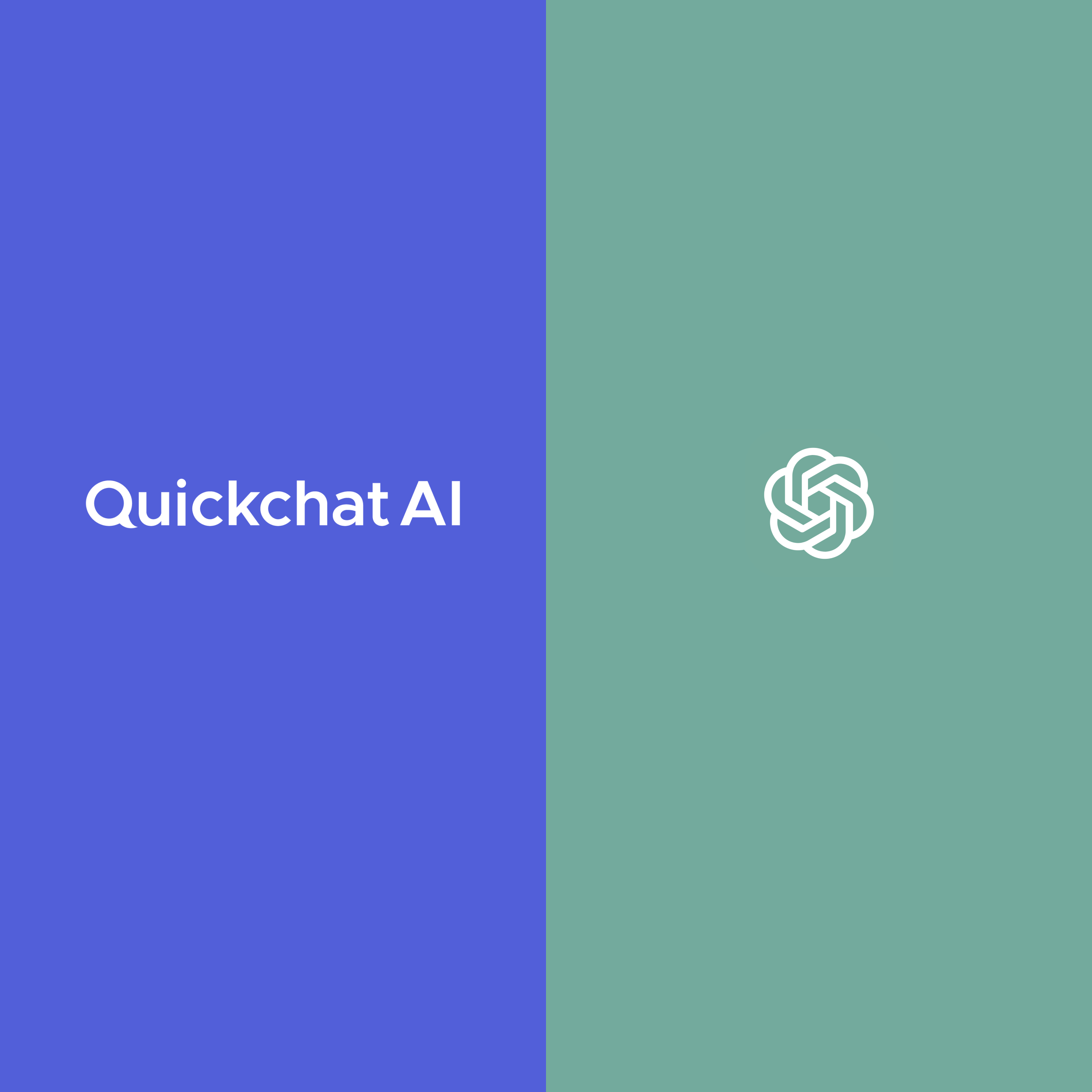What are GPTs?
Following the introduction of ChatGPT one year ago, OpenAI is now offering a platform to build “GPTs”, custom versions of ChatGPT tailored to specific roles or tasks. It will be accessible to ChatGPT Plus subscribers and OpenAI enterprise customers.
It’s yet another leap forward in the rapidly evolving field of AI, likely to promote broader AI adoption worldwide.
At Quickchat AI, we vividly remember the summer of 2020, the largely overlooked launch of GPT-3 which to us was a revolution and a clear sign of the things to come. However, we recognize that businesses have their specific and individual needs that general-purpose models by themselves cannot fulfill. Having worked with hundreds of clients, it has become clear to us that companies need more control over AI if they were to implement it front and center in their business.
Here is where Quickchat AI sets itself apart and can help you truly adopt AI to your business—and stay in control over its output and performance.
1. The need for control: comprehensive customization capabilities
While GPTs have made significant progress in serving B2C markets, allowing people to customize ChatGPT for various uses, they still have limitations, especially for developers looking to build AI Agents outside of the OpenAI platform. Quickchat AI, in contrast, is designed with business clients in mind. Our platform offers deeper, more specialized customization , enabling businesses to create AI Agents that are not just functional but also aligned with their specific brand voice and customer service goals.

Quickchat AI lets you customize the AI Agent to your specific requirements
With our built-in tools, you can customize your Assistant until every response is just perfect. We enable you to change the conversation style using AI Personality and Creativity Level, manage reply length, use Links (URL) priority to send your customers to the right places, and, if needed, transfer the conversation to your human agent with our automated Human Handoff feature. Quickchat AI lets you create an Assistant that’s tailored exactly to your requirements.
2. The details are what matters: we don’t settle for a 90% correct
response rate
OpenAI’s GPTs are based on Large Language Models (LLMs), which are remarkable in the amount of knowledge they have and ability to generate human-like text. However, when it comes to full control and specificity, LLMs can fall short. And it’s not just about incorrect answers or hallucinations. An AI Agent that speaks on behalf of your company to users needs to talk exactly as you would have, including the right style, vocabulary, and flow of argument. We can’t just set this aside and hope that a black-box language model will magically sort it out. Quickchat AI introduces tools and processes to address exactly that.
The main concern for companies is not the AI’s best responses, but rather the bottom 10% that can lead to customer confusion or damage your reputation. For instance, if AI provides incorrect information during a conversation with a customer, such as recommending competitor’s product or giving false information about return policies, it can harm your business.

You’d want to avoid situations like this
Simply offering teams the ability to create AI Agents with basic input and control doesn’t solve that issue. What’s needed are precise tools that allow for the customization of responses to fit specific scenarios.
That’s why our commitment is to develop advanced customization tools. They provide not just control but also reliable and consistent performance of the AI Agents.
While users initially get excited about the AI’s user-friendliness and impressive responses, it quickly becomes the standard expectation. Their attention then turns to the lowest-quality 10% of responses, which can be problematic for their business. Having been impressed already, they are now seeking consistency and dependability. We deliver you both.
3. Business doesn’t live in a vacuum: multiple and advanced integrations
Another key difference is scalability and integrations. Quickchat AI’s solutions are engineered to grow with your business and integrate within your existing tools. That level of integration ensures that AI Agents are not just extra components but integral parts of the business workflow, a feature that generic GPTs struggle to match.

Quickchat AI integrates with tools you already use
We understand that adding completely new software to your current, already complex tool stack always causes friction. That’s why we offer various integrations with applications you already use such as Intercom or Facebook Messenger, giving you Quickchat AI’s power within tools you use every day—all that without a single line of code on your side.
4. Understand why AI behaved the way it did: AI insights
Understanding the behavior of AI systems is crucial for businesses, especially when responses differ from expectations. When your AI gives an unexpected answer, the instinct might be to question the AI’s capabilities. However, the real issue often lies within the Knowledge Base it draws from or the user’s AI settings. The more expansive and complex the business’ inputs, the higher the chance of encountering unclear or contradicting information. This complexity is natural for a growing business, but it raises a vital question: how can we prevent these inconsistencies?
At Quickchat AI, we are committed to offering users a level of transparency and control over their AI systems that is unparalleled. Our approach involves leveraging robust general LLMs (such as GPT) with retrieval augmented generation and custom-built modules to ensure accuracy and consistency. This technology not only enhances the AI’s performance but also provides critical insights into its operations.
A key feature we’re developing allows users to pinpoint the specific sections of the Knowledge Base that influenced the AI’s response. That functionality is more than just a diagnostic tool; it’s a window into understanding the AI’s decision-making process. By identifying which parts of the Knowledge Base are being utilized, businesses can not only comprehend the AI’s responses but also refine and improve their Knowledge Base. This process of continuous improvement and refinement is essential for maintaining an effective AI system.
The richness of the Knowledge Base correlates directly with the quality of AI responses and the level of automation that can be achieved. By ensuring that your Knowledge Base is clear, comprehensive, and free of contradictions, you empower your AI to provide accurate, reliable, and high-quality responses. That, in turn, enhances customer interactions and drives business efficiency.
5. Transparency and control go hand in hand: conversation analytics
Data-driven improvement is central to Quickchat AI. Our platform offers robust analytics tools that allow businesses to track and analyze the performance of their AI Agents. That data is crucial for ongoing improvement, refinement and customization, ensuring that the AI Agent evolves in response to real- world interactions and works well in a commercial setting. In contrast, GPTs don’t provide the same level of detailed analytics and therefore don’t facilitate iterative improvements based on your customer interactions.

A part of Quickchat AI conversation analytics dashboard
6. We work with businesses every day: ongoing support and closed feedback
loops
We’re a company just like you and we understand that every business has unique needs and challenges. Our approach to AI in the business setting is based on that very premise. Our team works closely with clients to ensure that their AI solutions are perfectly aligned with their business objectives. Personalized support and collaboration are often missing from general-purpose AI solutions like GPTs, where the focus is on general applicability rather than tailored solutions. We’re always there to help you get the most out of your AI. We’re always open to building custom solutions, giving a unique AI experience for your business.
7. Freedom to choose: avoid the vendor lock-in
Adopting GPTs comes with a notable limitation: it binds companies exclusively to OpenAI’s technology. That can be a concern, particularly for those looking to maintain flexibility in their AI strategies. Quickchat AI tackles that issue head-on by offering the freedom to choose between different Large Language Model (LLM) vendors. That flexibility is crucial as the world of open-source models continues to evolve, potentially matching or even surpassing the capabilities of OpenAI’s offerings in certain aspects.
Moreover, data security is of paramount importance for many businesses. The prospect of sending sensitive data to OpenAI might not always align with a company’s data security policies or preferences. Quickchat AI provides an alternative by offering an infrastructure where businesses can select their preferred vendor, ensuring that data handling aligns with their security standards and compliance requirements.
In essence, we let you decide. That ensures businesses are not constrained to a single technology provider but have the agility to adapt and choose the tools that best fit their evolving needs and preferences.
Conclusion
The world of AI is vast and varied, and while general AI models like OpenAI’s GPT offer impressive capabilities, they may not meet the specific needs of businesses seeking specialized AI solutions. Our platform is specifically designed with the unique needs of businesses in mind, offering a level of customization, control, and integration that generic AI models simply cannot match. Combining the power of AI with deep customization and business-oriented features, Quickchat AI is not just an innovative software but a strategic partner in leveraging AI for business success.

